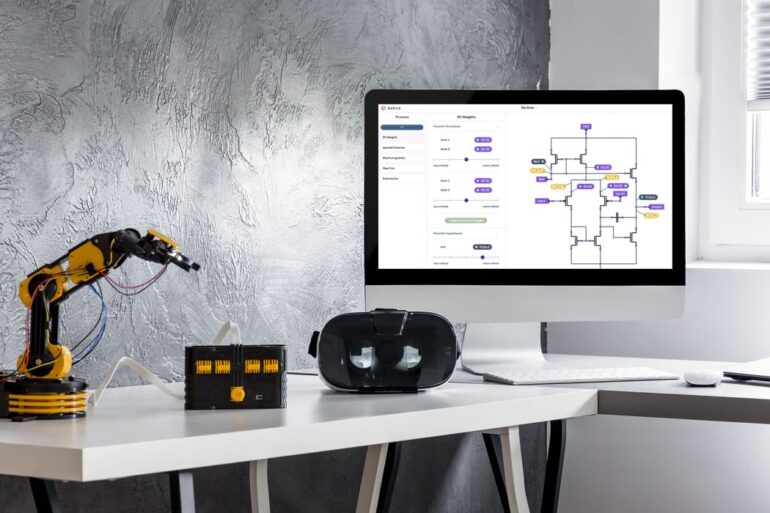Toronto and Kitchener-Waterloo, Ont.-based artificial intelligence (AI) software startup Astrus says it has closed $8 million USD ($11 million CAD) in seed funding to help semiconductor companies automate the design of analog circuits for advanced microchips.
“Every breakthrough in human progress, from curing diseases to exploring space, depends on faster, more efficient computation.”
Brad Moon,
Astrus
Astrus co-founder and CEO Brad Moon claimed to BetaKit in an email that physical layout is “the hardest, most time-consuming, and most costly part of chip design, especially for custom analog and mixed-signal circuits.” With its AI-powered software, Astrus hopes to automate this process.
While Astrus is still in research and development mode at the moment, Moon says the company is already engaged in discussions with several Tier-1 semiconductor companies, and is gearing up to run its first paid pilots in early 2026.
Moon argued that Astrus’ approach will save clients “enormous amounts of time and money” in the near term. However, he sees a larger opportunity in using the tech to discover entirely new circuit architectures “that humans would never find on their own,” ones that could potentially offer greater performance and efficiency gains for cutting-edge chips.
“Every breakthrough in human progress, from curing diseases to exploring space, depends on faster, more efficient computation,” Moon said.
While chip design is becoming more automated, Astrus claims that the analog design portion of advanced semiconductors is still “a painstaking, manual process” that can take months and cost up to hundreds of millions of dollars to complete as engineers place and route transistors by hand.
The startup’s seed round closed in July and was raised via simple agreement for future equity. It was led by Khosla Ventures with support from fellow existing backers 1517 Fund, Drive Capital, Alumni Ventures, RiSC Capital, and MVP Ventures, among others. New investor Juniper Networks co-founder Pradeep Sindhu also participated.
RELATED: With new funding, Astrus has secured $3.6 million CAD to date for its AI microchip design offering
Astrus was founded in 2023 by Moon and CTO Zeyi Wang. Moon previously helped lead product discovery for ApplyBoard and spent some time designing satellite sensor chips, while Wang worked in a research group that laid the foundations for Google DeepMind’s AlphaGo, the first computer program to defeat a professional human Go player.
The company says it is applying the same reinforcement learning principles behind AlphaGo and AlphaZero and focusing its efforts on advanced chips like graphics processing units, networking silicon, and AI chips.
“We’re confident no one has built anything like this,” Moon said.
He claimed that Astrus’ AI tool processes physics information by simulation rather than by training on proprietary intellectual property. Moon said that when human designers provide their circuit schematic and performance requirements to Astrus, the startup’s AI system can generate thousands of potential physical layouts much faster and more cost effectively than a human for them to review, refine, and use.
RELATED: American chip giant AMD to acquire Untether AI team
Astrus plans to use this seed funding to add another six to 10 employees to its 13-person team in developer operations, AI, computation physics, analog design, and layout engineering.
Lately, promising Canadian semiconductor startups like CentML, Tenstorrent, and Untether AI have either moved south or been swallowed up by larger American players.
When asked whether Astrus has considered any similar steps, Moon said, “We’ll continue working with customers worldwide, including in the US, but our ambition is to build something special and lasting here in Canada, not simply to relocate or exit.”
“We believe Canada has the ecosystem to support an enduring, world-class company in this space,” Moon added, citing Canada’s global leader in the three disciplines that Astrus combines: chip design, software engineering, and AI.
Feature image courtesy Astrus.


